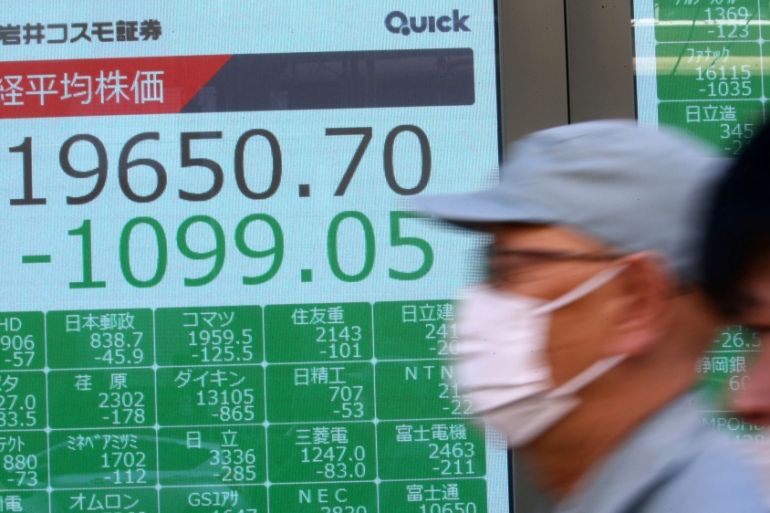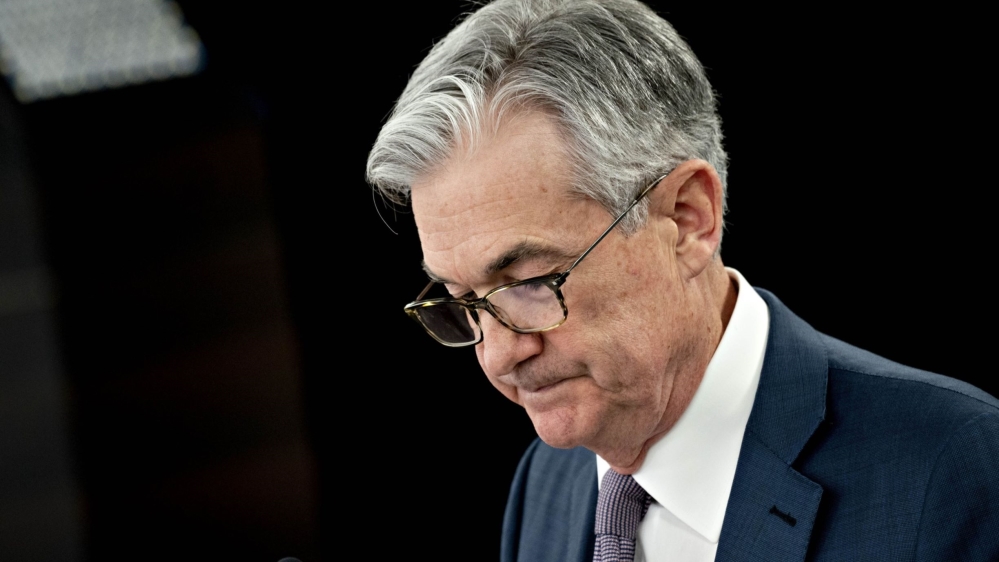US Fed’s ‘desperate’ move unnerves global markets
Despite a steep cut in US interest rates and moves by other central banks to help credit markets, stocks tank.

Kuala Lumpur, Malaysia – Asian shares plunged on Monday after the United States Federal Reserve‘s emergency move to slash its key interest rate to near zero failed to inspire confidence in a market dominated by mounting fear of the widespread effect of the coronavirus pandemic.
Central banks around the region announced measures to ensure that lenders had enough money to cover larger-than-usual demands for cash by companies stung by the almost complete shutdown of some businesses as part of measures to contain the virus.
Keep reading
list of 3 itemsUS Federal Reserve slashes rates to 0 to combat virus fallout
Economic paralysis: Coronavirus slams brakes on China economy
Analysts said they did not believe that moves by financial authorities to support commercial banks would necessarily help the broader global economy.
“Central banks definitely have tools and the remit to flush the market with liquidity and credit,” Vishnu Varathan, head of economics and strategy for Asia and Oceania Treasury at Mizuho Bank in Singapore, told Al Jazeera.
But the success of these liquidity-boosting measures relies on the “transmission” of this credit flow to the households or businesses that needed it, and central banks rely on financial intermediaries to channel this liquidity, he said.
“Transmission is in turn, especially in these stressed markets, dependent on confidence; which we are short on now,” Vishnu said.
Australia’s benchmark S&P ASX 200 index was the region’s biggest loser, plunging by 9.7 percent, its biggest one-day drop since the market crash of 1987, according to Refinitiv data.
Standing ready
Australian shares fell despite the central bank’s announcement that it stands ready to buy government bonds, and injecting $3.6bn into the country’s financial system. On Friday it injected a record $5.4bn to help lenders and borrowers.
“The Reserve Bank stands ready to purchase Australian government bonds in the secondary market to support the smooth functioning of that market, which is a key pricing benchmark for the Australian financial system,” Governor Philip Lowe said in a statement.
The central bank of neighbouring New Zealand slashed its key interest rate by three-quarters of a percentage point to try and cushion its economy from the effects of the viral outbreak.
The Japanese benchmark Nikkei 225 index slumped 2.46 percent, despite a promise by the central bank to ramp up the purchase of risky assets to prop up financial markets.
Hong Kong’s Hang Seng Index dropped 2.01 percent and South Korea’s KOSPI Index plunged 3.19 percent.
In China, the benchmark Shanghai Composite Index fell 2.65 percent.
Markets in Europe took their cue from Asia. The pan-European Stoxx 50 index was down 6.3 percent as at 11:00 GMT, with markets in the United Kingdom, Germany and France down between 6.5 percent and 8.5 percent.
And US stock futures tumbled by the maximum amount allowed by financial regulators before cash markets opened.
Down to zero
The US Federal Reserve, commonly known as the Fed, made a surprise move on Sunday and slashed the target range for its benchmark federal funds rate by a full percentage point to 0-0.25 percent.

The Fed also said it will resume its bond-buying programme with the purchases of at least $500bn of US Treasury securities and $200bn of mortgage-backed securities in the coming months.
The fact that the announcement came just hours before Asian financial markets opened, and days before its scheduled meeting, spooked investors further, raising concerns that the Fed’s urgency may be a signal that the economic effect from the COVID-19 fallout is far worse than initially feared.
The lack of a coordinated approach globally that combines with governments’ fiscal actions, such as tax cuts, and an effective plan to arrest the fast-spreading virus outbreak also rendered the Fed’s extraordinary move less convincing, analysts said.
Concerns that the Fed may be emptying its tank of potential measures too fast and too soon in case the situation deteriorates, dampened investor sentiments further, they said.
The fall in Asian equity markets in Asia on Monday was partly driven by “lack of faith in the [big] guns’ blazing approach by global central banks in the absence of coordinated fiscal and, perhaps, a healthcare response,” Mizuho’s Varathan, said.
The pandemic is paralysing the lives of people worldwide, with governments ordering people off the streets, while schools and shops are closed to curb the spread as the death toll from coronavirus climbs.
More than 1,800 people have died so far in Italy, with 368 deaths on Sunday. The country is the second worst-hit place after China.
In China, where the outbreak first started, the economy suffered a record blow with industrial output, investment and retail sales plunging in January and February, according to data released on Monday.
China’s industrial output contracted at the sharpest pace in 30 years in the first two months of the year, while urban investment and retail sales dropped sharply for the first time on record, based on figures published by the National Bureau of Statistics.
Industrial output in the world’s second-largest economy fell 13.5 percent in January-February from the same period the previous year.
“There are a lot of uncertainties, a lot of fear in the markets. The [stock] market should be up in normal time, but because of the high level of uncertainties, the market is down,” Choo Swee Kee, TA Investment Management Bhd’s chief investment officer in Kuala Lumpur, told Al Jazeera.
“Investors are reading the [Fed rate cut] as desperation. I can’t say whether it’s right or wrong,” Choo said. “The market is not moving along fundamentals but it’s moving along fear factor. It’s hard to estimate what’s the maximum level of fear.”
In addition to the interest rate cut and bond-purchase programme, the Fed rolled out other measures on Sunday including cutting the amount of money that many banks need to maintain at the Fed – the so-called reserve requirement – to zero.
It was among a package of measures designed to help banks more easily meet the demands of creditors ranging from households to businesses.
Sliding oil
Even with the massive stimulus from central banks globally, fears of a potential credit crunch for companies that needed the money most continued to stalk the markets.
Meanwhile, an intensifying price war between two of the world’s top producers, Saudi Arabia and Russia, depressing crude prices and many of the countries and sectors of the global economy that rely on energy exports.
Brent crude was down 3.1 percent at $32.80 per barrel. It is down from a peak of more than $59 per barrel on February 20, less than a month ago.
Even bitcoin, the world’s largest cryptocurrency fell 3.8 percent.
“The (stock) market is acting in a very short-term manner, not knowing how bad the COVID-19 will spread and how much is the impact,” Alexander Chia, head of regional equity research at RHB Investment Bank in Kuala Lumpur, told Al Jazeera.
“There’s no answer to that. So with all these uncertainties, you don’t know where the bottom of the market is,” Chia said.
“We are in uncharted territories now. We now have multiple negative factors affecting the market that all come at one go, it’s a confluence of multiple black swans kind of event. We are telling clients that in the short term, you need a very defensive posture, cash is the first thing. Even bonds can’t entirely escape. There’s no respite,” he said.